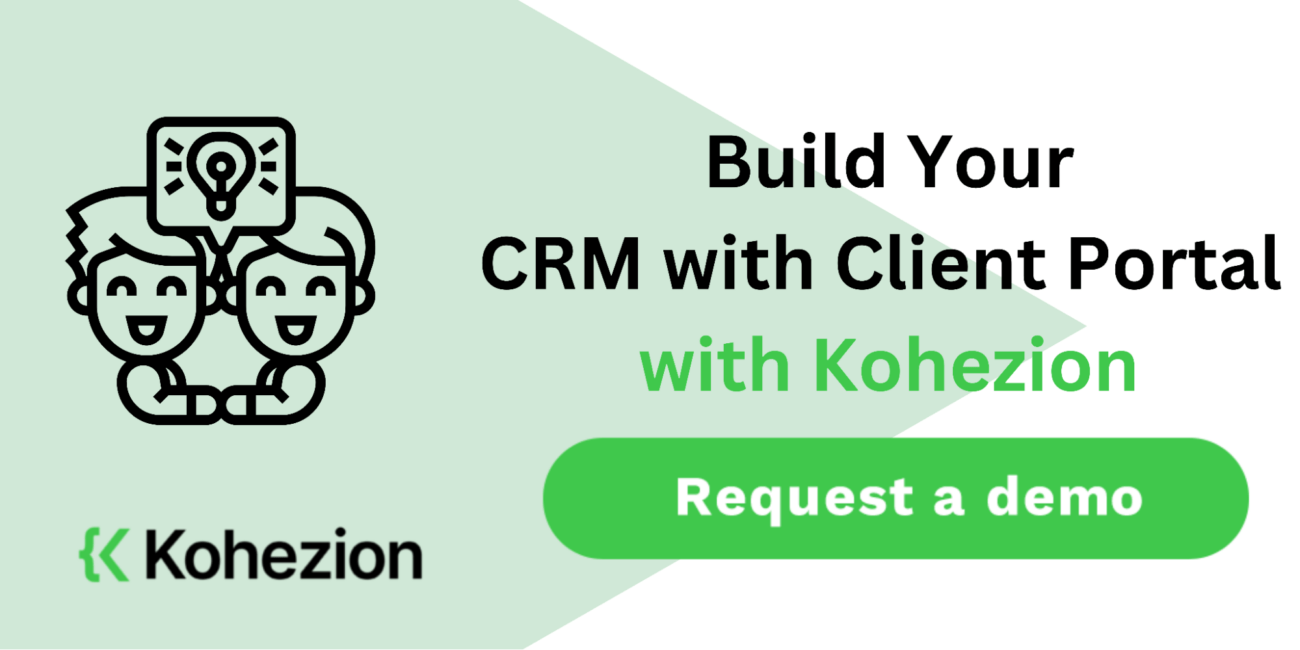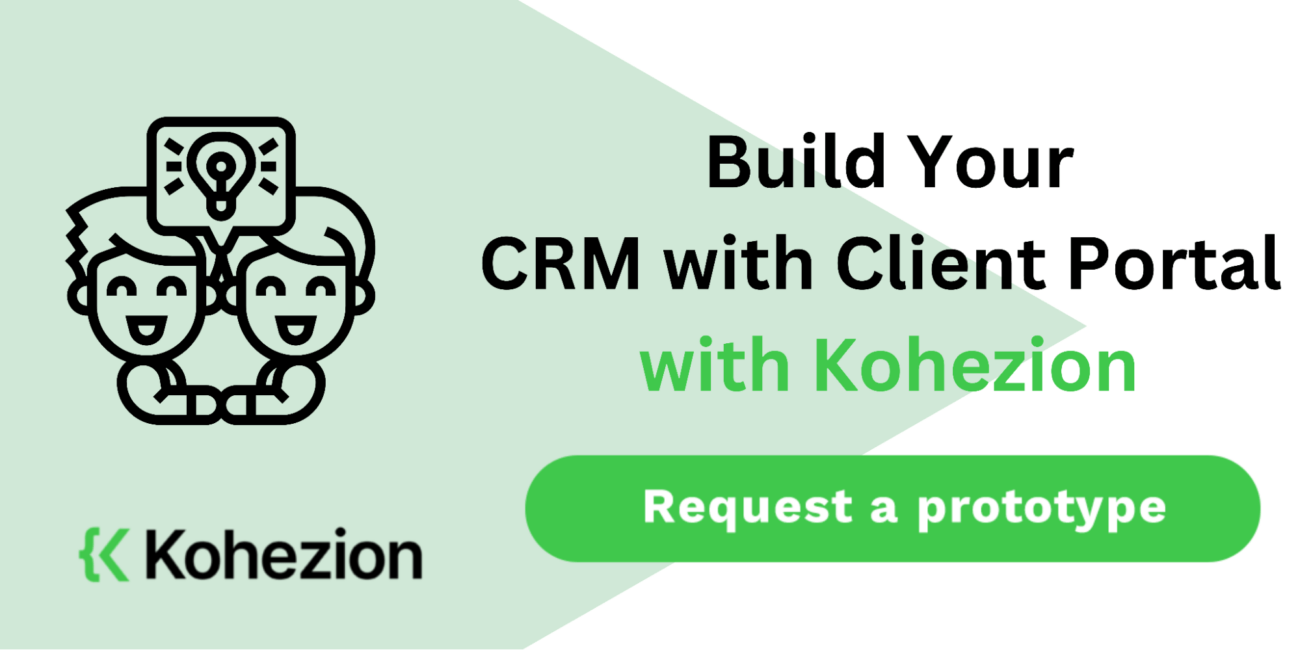Studies show that using a CRM with a client portal can improve the client experience and increase revenue by up to 15%. A client management system with a portal can improve customer communication and make managing projects easier. They save you a lot of time and effort. You can handle all parts of your client relationships in one place.
This post will guide you through the best CRM solutions for better customer interaction.
What is a CRM with a Client Portal
A Customer Relationship Management (CRM) system with a client portal combines tools for managing customers with an online space for clients. It keeps all client information, such as contact details and project notes, in one place. This makes data easier to find and helps teams work better together.
The client portal lets clients check their project status and send documents. Clients can also talk to your team in real-time, ensuring they are always in the loop and feel involved.
Software like SuiteDash shows how well CRM systems and client portals work together. It offers tools for sharing files, managing clients, and talking to them. This helps businesses serve their clients better and makes the experience more enjoyable.
Why is a CRM with a Client Portal Important
Businesses need a CRM with a client portal to increase client engagement and satisfaction. The CRM with client portal lets clients access important services and information directly, making it easier for them to work with your company. The importance of CRM with Client Portal lies in its ability to build trust and strengthen client relationships with transparency.
Client portals also help your internal operations. When clients can solve problems on their own or track their services, your customer service team is less busy, leading to a more personalized and responsive customer experience.
Benefits of CRM with Client Portal
Using a CRM with a client portal can change how your business works. Here are the most important benefits of using one:
Improved Efficiency and Productivity
One big plus is how it makes your work more efficient. It automates tasks, organizes files, and tracks messages. This means your team can do more important things.
Better Customer Experience
It also makes your customers happier. They can access their information, update it, and find answers on their own, which makes them more likely to stay with you.
Strengthened Security
Security is key, and this setup helps a lot. It controls who sees what, keeping your clients' info safe. This builds trust with your clients.
Streamlined Collaboration
Working together becomes easier with a CRM and client portal. You can easily share files and information, which improves teamwork.
Personalized Marketing
It also helps you market better. You can use the data to make ads that speak to your clients. This can lead to more people engaging with your brand.
Greater Access to Real-Time Data
The client portal gives you instant access to client data and sales stats, helping you make smart decisions quickly.
Faster Issue Resolution
It also means you can fix problems quickly. Your team can tackle issues quickly with all the data and tools at your fingertips. This makes your customers happier and more loyal.
Improved Customer Retention
A CRM and client portal enables you to provide great service and keeps customers coming back. They appreciate the personal touch and support. This leads to more people staying with your business.
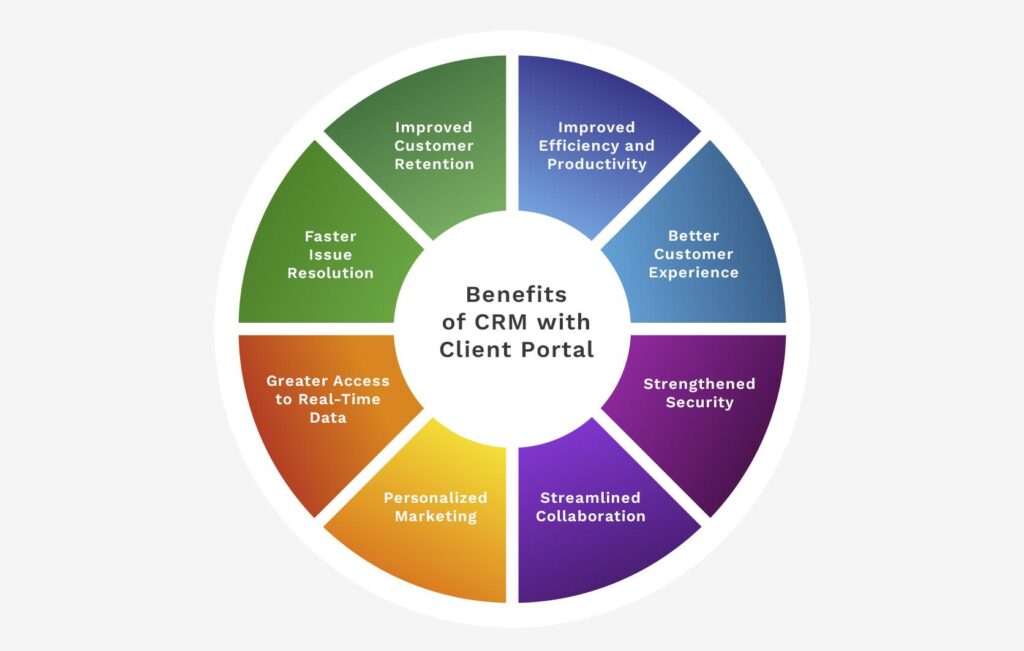
Top 10 CRMs with Client Portals
Here are the top 10 CRMs with client portals that can help you manage your customer relationships more effectively.
1. Kohezion
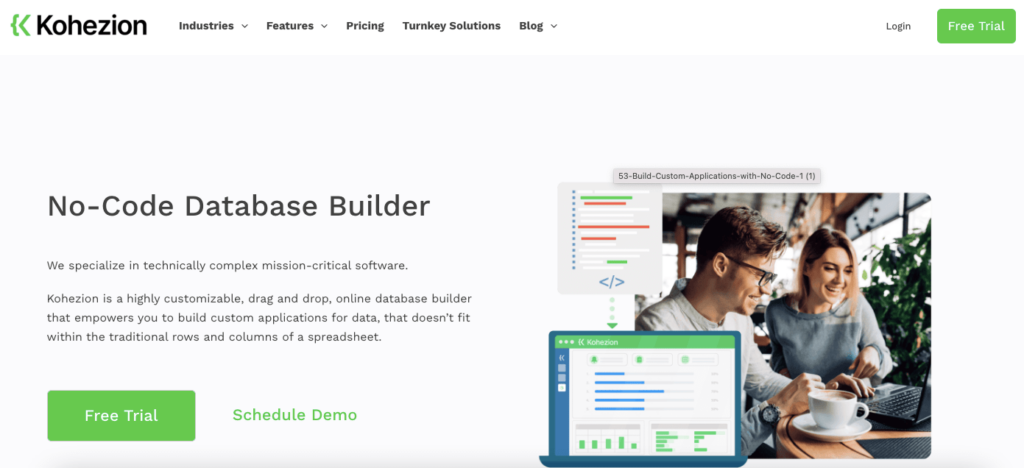
Alt text: kohezion online database software the best crm with client portal
Kohezion is a versatile and customizable CRM with a client portal that focuses on data management and security. It's designed for businesses that need flexibility in creating custom applications without requiring technical skills. Kohezion offers a range of features that simplify client collaboration and streamline workflows.
Top 5 Features
- Customizable dashboards for tracking metrics
- Secure client portal for real-time collaboration
- Role-based access controls for improved security
- Advanced data analytics and reporting
- Flexible app-building tools for unique business needs
5 Benefits
- Improves data management efficiency
- Improves client collaboration and communication
- Provides tailored solutions for different industries
- Ensures security with role-based permissions
- Supports scalability as business needs grow
2 Cons
- Steep learning curve for new users
- Limited third-party integrations compared to competitors
Best For
Businesses that need a highly customizable CRM with strong data security features.
2. Salesforce CRM
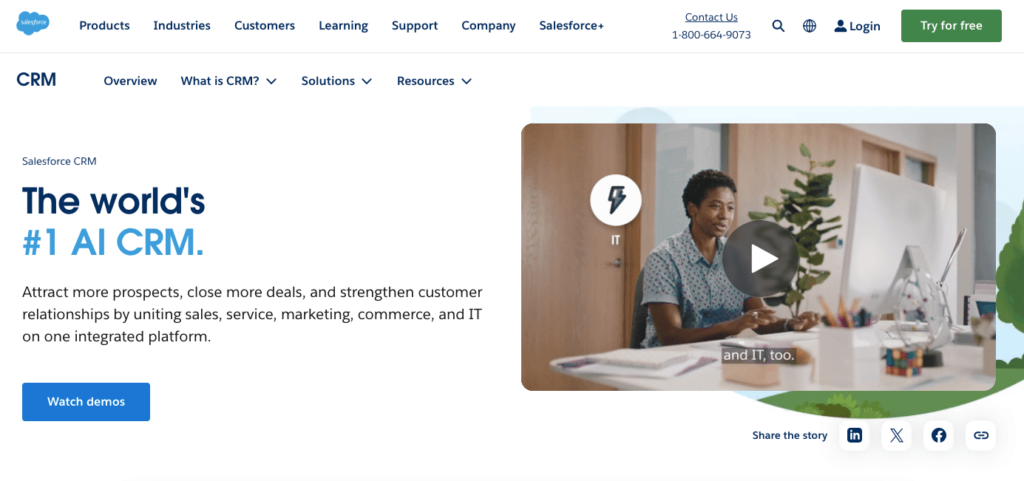
Salesforce is a market-leading CRM that offers robust client portal capabilities. It’s known for its vast integration options and scalability, making it ideal for businesses of all sizes. Salesforce allows for real-time communication and workflow automation, increasing productivity and customer satisfaction.
Top 5 Features
- AI-driven insights with Einstein Analytics
- Secure and customizable client portal
- Extensive integration with third-party apps
- Automated workflows and task management
- Real-time reporting and forecasting tools
5 Benefits
- Improves decision-making with AI insights
- Streamlines customer communication
- Scales easily with business growth
- Automates routine tasks, increasing productivity
- Integrates seamlessly with various tools and platforms
2 Cons
- High cost, especially for small businesses
- Complex setup and configuration process
Best For
Large enterprises and businesses looking for advanced CRM features with a powerful client portal.
3. NetSuite CRM
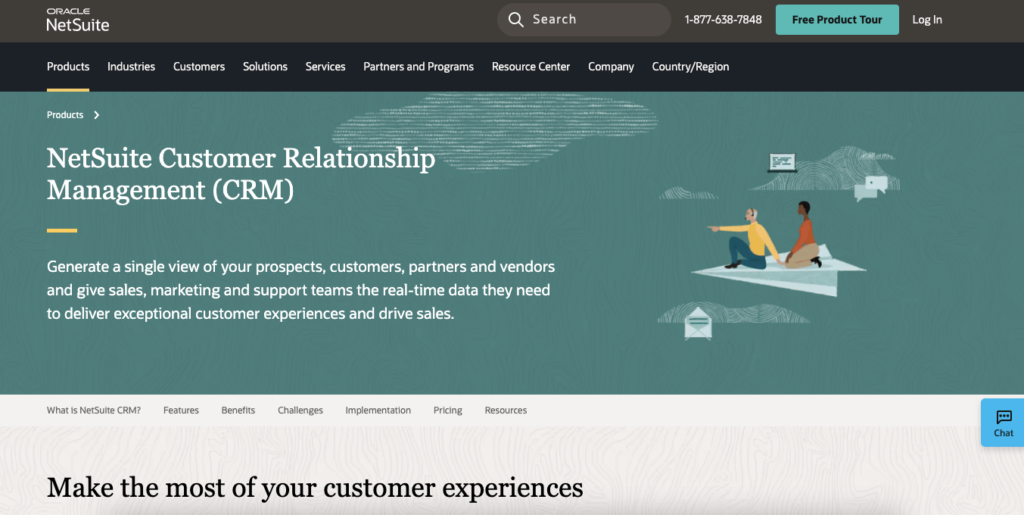
NetSuite CRM is a cloud-based solution that provides a complete view of customer interactions, making it easy to manage sales, marketing, and customer support. With a strong focus on automation and integration, NetSuite CRM improves customer service efficiency and business performance.
Top 5 Features
- Real-time customer data management
- Customizable client portal for self-service
- Automated marketing and sales processes
- Integration with ERP and financial systems
- Advanced analytics and reporting tools
5 Benefits
- Improves visibility into customer interactions
- Streamlines marketing and sales efforts
- Improves decision-making with real-time insights
- Provides seamless integration with business systems
- Increases productivity with workflow automation
2 Cons
- Expensive for smaller businesses
- Can be complex to customize
Best For
Medium to large businesses that need a full-featured CRM integrated with ERP.
4. HoneyBook
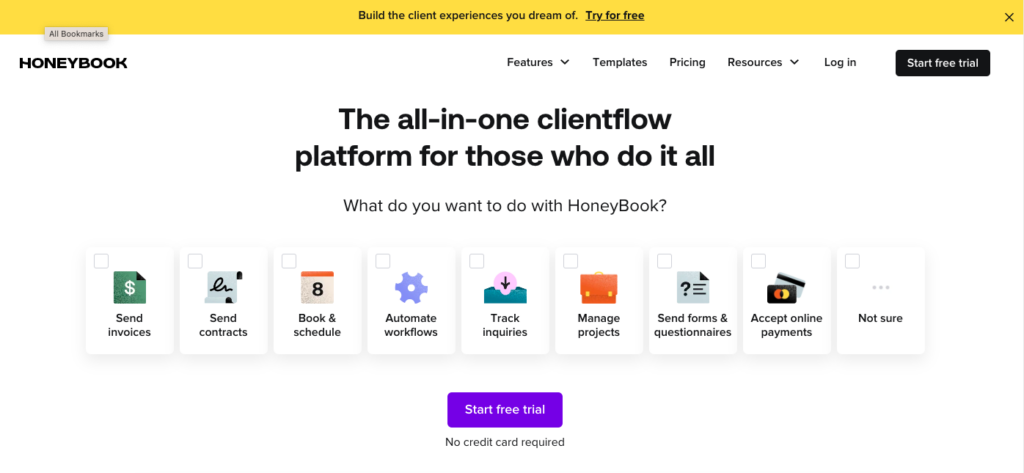
HoneyBook is a CRM designed for small businesses and freelancers. It offers project management, invoicing, and client portal features. It simplifies managing client relationships in a single platform, from inquiries to payments. HoneyBook is user-friendly and well-suited for creative professionals.
Top 5 Features
- Invoicing and payment processing with the portal
- Customizable project workflows and task tracking
- Client portal for secure document sharing
- Built-in scheduling and calendar management
- Integrated proposal and contract templates
5 Benefits
- Simplifies invoicing and payment tracking
- Improves communication with clients via a secure portal
- Speeds up project management tasks
- Reduces paperwork with digital contracts
- Improves organization with integrated scheduling
2 Cons
- Limited third-party integrations
- Lacks advanced reporting features
Best For
Freelancers and small business owners looking for an easy-to-use CRM with client portal features.
5. Zoho CRM
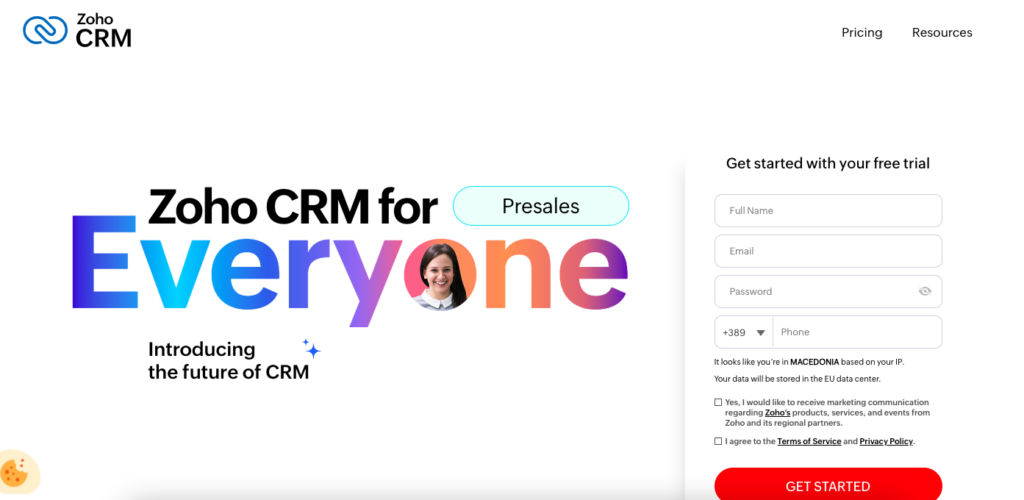
Zoho CRM is a flexible, cloud-based platform for small and medium-sized businesses. With a built-in client portal, it provides tools to manage customer interactions, automate sales processes, and improve efficiency. It’s known for its affordability and customization options.
Top 5 Features
- Customizable client portal for communication
- Multi-channel communication support (email, phone, social)
- AI-powered sales predictions
- Integration with Zoho suite and third-party apps
- Automated workflows and task assignments
5 Benefits
- Affordable pricing for small businesses
- Improves client communication across channels
- Automates repetitive tasks, saving time
- Improves sales predictions with AI tools
- Integrates seamlessly with other Zoho products
2 Cons
- Limited advanced features for large enterprises
- Can be challenging to set up initially
Best For
Small to medium businesses needing an affordable, customizable CRM with a client portal.
6. Glue Up
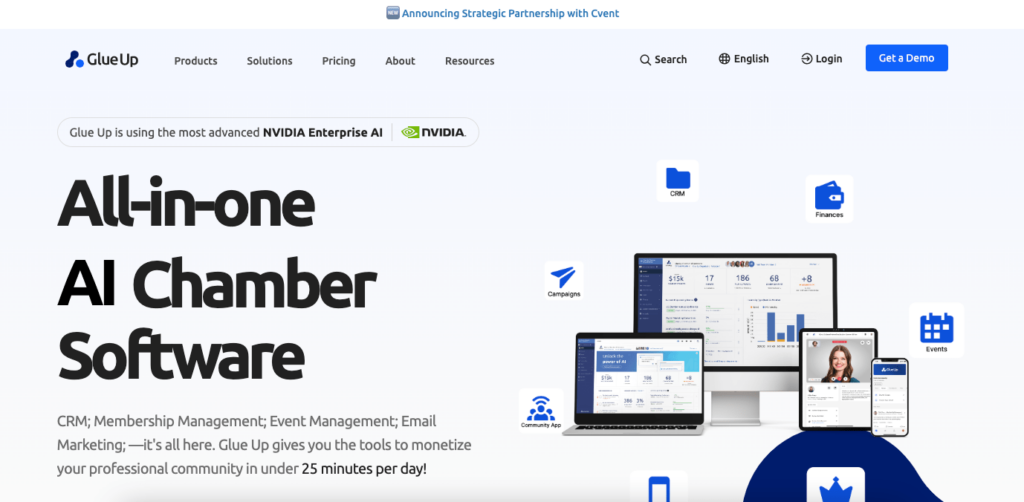
Glue Up is a CRM solution focused on event management and community engagement, with a client portal feature for seamless communication and interaction. It’s ideal for organizations that manage memberships, events, and networking opportunities. Glue Up integrates all these features into a single platform.
Top 5 Features
- Client portal for event registration and updates
- Membership management with automated renewals
- Integrated email marketing tools
- Event and meeting scheduling features
- Community engagement tools
5 Benefits
- Simplifies event management for organizations
- Improves member engagement with automated tools
- Centralizes communication
- Streamlines membership renewals and updates
- Improves collaboration with community engagement features
2 Cons
- Not ideal for businesses without event-focused needs
- Can be expensive for smaller organizations
Best For
Organizations focused on event management and community engagement.
7. Bitrix24
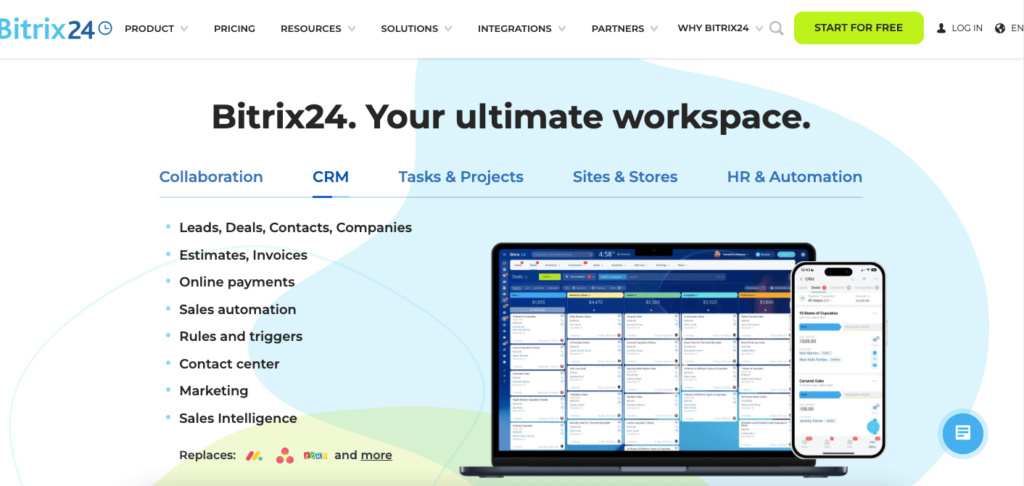
Bitrix24 is an all-in-one CRM and collaboration platform that offers a client portal for managing customer interactions and sharing project information. It provides task management, team collaboration, and communication tools, making it suitable for businesses with multiple departments.
Top 5 Features
- Client portal for sharing tasks and documents
- Built-in project management tools
- Customizable dashboards and workflows
- Integration with popular communication tools
- Task automation and workflow management
5 Benefits
- Improves project collaboration
- Improves task tracking and management
- Automates repetitive workflows
- Centralizes communication between teams and clients
- Customizable to fit various business needs
2 Cons
- Steep learning curve for new users
- Limited customer support
Best For
Businesses with complex projects and multiple teams that need a collaborative CRM solution.
8. Monday.com
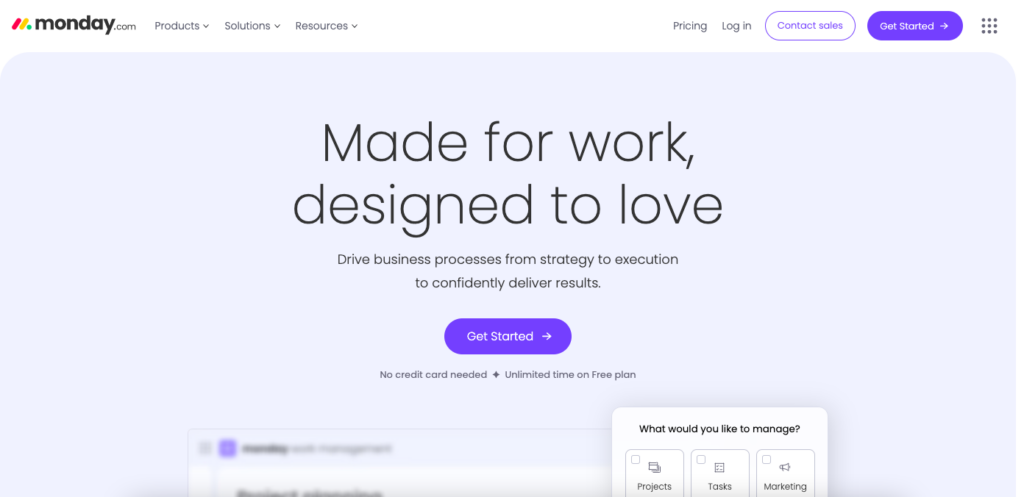
Monday.com is a flexible project management and CRM tool with client portal features. It’s designed to improve team collaboration, task management, and client communication. With its user-friendly interface and customizable workflows, Monday.com helps businesses manage client interactions more efficiently.
Top 5 Features
- Customizable client portal for real-time updates
- Visual project management boards
- Integration with popular third-party apps
- Automation for task management and reminders
- Collaboration tools for team and client interactions
5 Benefits
- Streamlines client communication
- Visual project tracking improves team productivity
- Automates routine tasks to save time
- Easy integration with tools like Slack and Google Drive
- Flexible for teams of all sizes
2 Cons
- Limited CRM-specific features compared to competitors
- Can get expensive with advanced features
Best For
Teams needing a flexible, visually oriented CRM with strong project management tools.
9. ClickUp
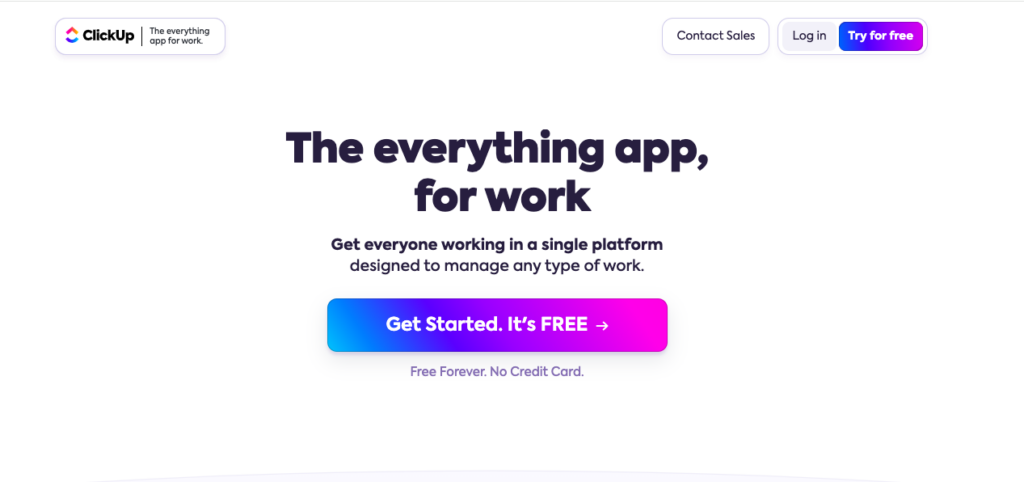
ClickUp is a highly customizable project management and CRM platform with client portal features. It provides tools for task management, goal tracking, and team collaboration. Its versatility makes it suitable for businesses of all sizes looking for an all-in-one solution.
Top 5 Features
- Customizable client portal for sharing updates and documents
- Task management and goal-tracking tools
- Integrations with hundreds of third-party apps
- Real-time collaboration with clients and teams
- Time tracking and reporting features
5 Benefits
- Improves team and client collaboration
- Improves productivity with task automation
- Tracks progress and performance in real-time
- Seamlessly integrates with external apps
- Offers detailed reporting and insights
2 Cons
- Overwhelming feature set for new users
- Free version has limited advanced features
Best For
Businesses needing a versatile CRM and project management tool with customizable features.
10. Airtable
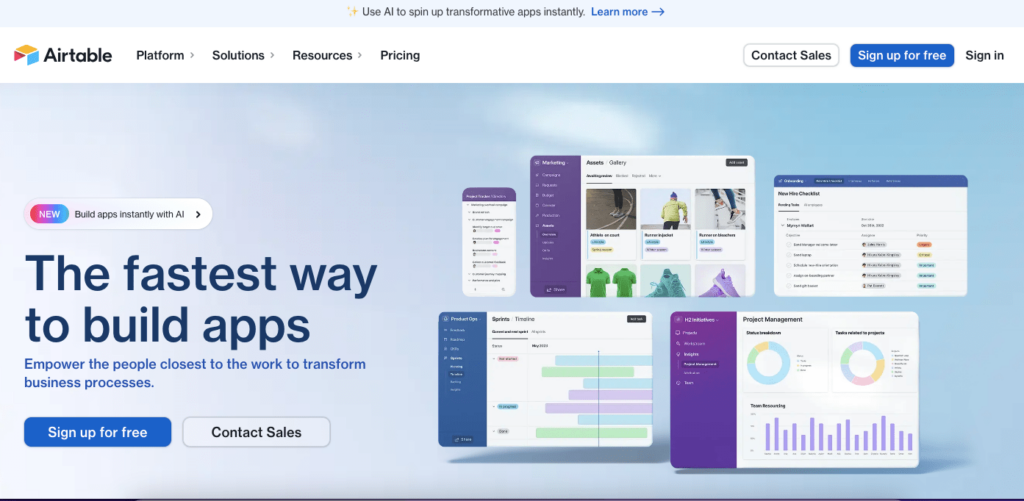
Airtable is a flexible, spreadsheet-like CRM and project management tool that includes a client portal for sharing information and collaborating with customers. Its ease of use and visual appeal make it popular with teams needing simple, customizable solutions for managing client relationships and projects.
Top 5 Features
- Visual database and client portal for easy collaboration
- Customizable templates and workflows
- Real-time collaboration with team and clients
- Integration with popular apps and services
- Flexible project tracking and task management
5 Benefits
- Easy to set up and use with no technical expertise
- Improves collaboration with customizable views
- Automates repetitive tasks for efficiency
- Offers seamless integration with external apps
- Visually organizes data for better project management
2 Cons
- Limited advanced CRM-specific features
- May not scale well for large enterprises
Best For
Small to medium teams looking for a visually appealing, flexible CRM with a client portal.
Top Features in a CRM with Client Portal
Knowing what a CRM with a Client Portal can do is key. These tools make work easier, keep things safe, and help you talk better with clients. The main features make a CRM with a client portal a must-have.
Secure Document Sharing
Keeping client information safe is a big deal. This feature allows you to share files securely. It ensures that only the right people can see important documents, building trust with your clients.
Real-Time Communication Tools
These tools let you and your clients talk and update things fast. They make it easy to answer questions and keep relationships strong. Quick chats also make work more efficient.
Personalized Client Dashboards
Client dashboards let clients manage their information easily. They show data that's important to each client, making it simple for clients to see what's going on and what they need.
Task and Project Management Integration
Having task and project management in one place makes things run smoother. You can keep an eye on projects and tell clients about their progress. It helps you stay organized and on schedule.
Customizable Access Controls
Custom access controls let you set up how clients can see and edit info. You can decide who gets to see what, keeping things safe and easy to use. It makes the experience better for everyone.
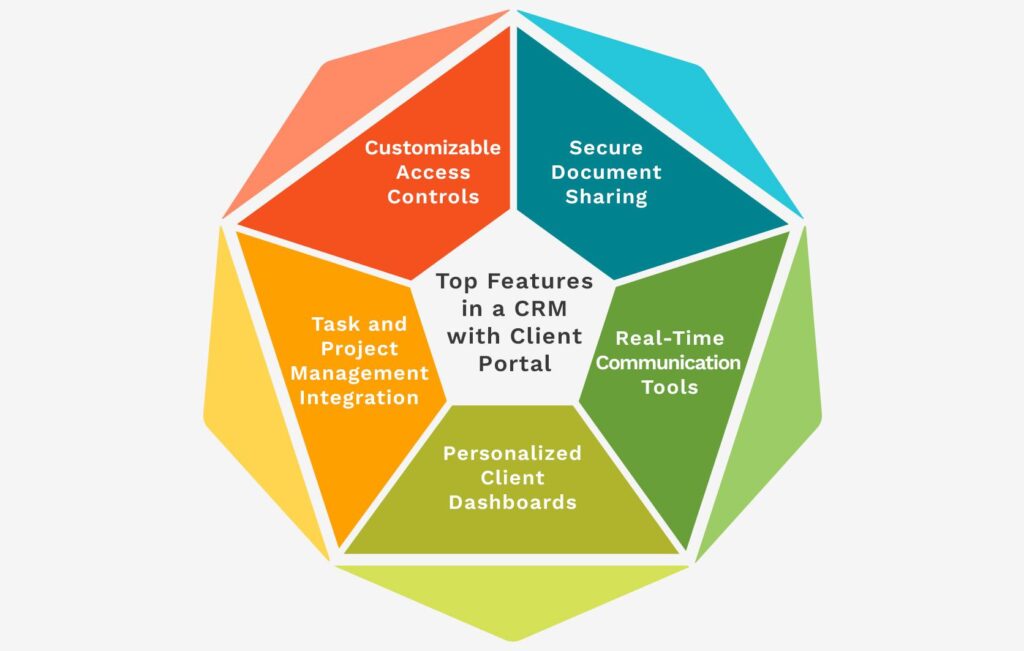
Factors to Consider When Choosing a CRM with a Client Portal
Choosing the right CRM with a client portal is a big decision. Consider several key aspects. Knowing these factors can help you pick a CRM that meets your business needs and improves your work.
Available Features
First, check the features of different CRMs. Look for tools that match your needs, such as secure document sharing, communication tools, and customizable dashboards.
Level of Customization
Customization is key. The best CRM is one that can be tailored to your workflow. This makes the system more user-friendly and efficient.
Ease of Use
The CRM needs to be easy to use. A simple interface helps your team and clients use it without hassle, leading to faster adoption and less stress.
Integration Capabilities
A good CRM integrates well with other tools, such as email marketing or project management systems, to improve workflow.
Security Measures
Remember security. A strong CRM protects client data. Check the security features to ensure they meet data protection standards.
Scalability Options
You need a CRM that grows with you. It should allow for more features or users without costing too much.
Mobile Accessibility
Mobile access is now a must. A CRM that works well on mobile lets you manage tasks and talk to clients anywhere. This is very useful.
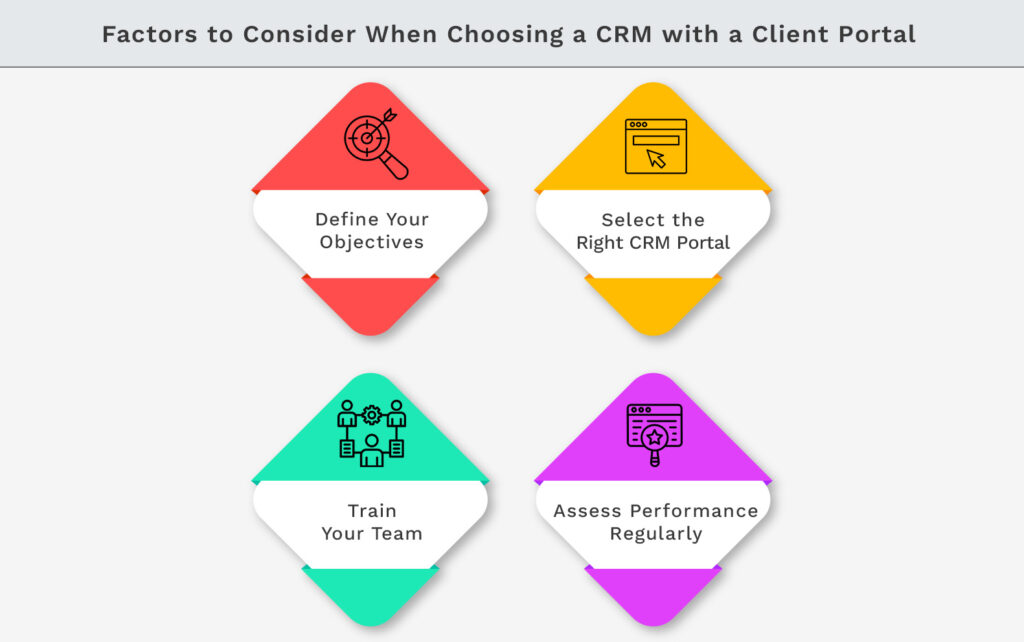
How to Implement and Optimize a CRM with Client Portal
Starting a CRM with a client portal can improve your business. First, determine your goals. This will guide the whole setup process.
Define Your Objectives
Set clear goals for your business. Knowing what you want to achieve helps shape your strategy and allows you to use the client portal's features effectively.
Select the Right CRM Portal
Choosing the right CRM portal is key. Look at different options based on your goals and the features you need. Make sure it fits your objectives well.
Train Your Team
Don't forget about training your team. They need to know how to use the system fully. Good training helps everyone get used to the new system.
Assess Performance Regularly
Finally, check how well the CRM and client portal are doing regularly. This helps spot areas for improvement, and making changes can keep your investment valuable for your business.
Improving Communication and Collaboration with Kohezion
Kohezion offers advanced features for better teamwork. It makes file sharing, project management, and real-time talks easy, helping your team work better on client projects.
The platform makes client onboarding and signing documents easy. This ensures you can work with clients smoothly while keeping things organized and clear. Kohezion improves workflows and helps teams communicate more effectively, which is key for strong client relationships. Using these tools also increases client engagement with clear and timely communication.
Conclusion
Getting a CRM with a client portal is more than just a tech update. It's a smart move that can improve your business. This article shows how CRM with Client Portal systems can improve things. They help you work more efficiently, improve customer service, and team up better.
These systems help you manage client interactions and data in one place. This makes things smooth for your team and clients. You've seen how these solutions make processes easier and improve communication. This can lead to happier clients and better retention.
A CRM with a client portal is an investment in your business's future. It helps you work better and connect with customers in a more personal way.
Using a CRM with a client portal lets you track your progress, keep things safe, and offer services that clients really need. These systems help you grow your business and maintain strong client relationships.
If you're ready to take your business to the next level with a CRM that includes a client portal, contact Kohezion today to see how we can help streamline your operations and improve client relationships.
Start building with a free account
Frequently Asked Questions
Yes, a CRM with a client portal is designed to handle multiple clients simultaneously. It allows each client to have their own personalized portal where they can view their data, interact with your team, and access specific information. This helps organize and manage client interactions efficiently without confusion or overlap.
The cost of implementing a CRM with a client portal varies depending on the provider and the features you need. Some CRMs offer affordable plans for small businesses, while more advanced solutions for larger companies may come with a higher price. However, the increased efficiency and customer satisfaction can often justify the investment.
CRMs with client portals should be updated regularly to ensure security, functionality, and user experience. Most CRM providers roll out automatic updates to fix bugs, add new features, or improve performance. Keeping the system up to date ensures smooth operation and helps protect sensitive client information from potential security risks.
Yes, many CRMs with client portals allow integration with social media platforms. This enables businesses to manage social media interactions, track leads, and monitor customer feedback directly within the CRM. It helps keep all customer interactions in one place, whether via email, phone, or social channels.
Training needs vary depending on the complexity of the CRM. For most user-friendly systems, minimal training is required, and team members can quickly learn to navigate the platform. However, additional training or support may be necessary to maximize the tool’s potential for more advanced features, like custom workflows or integrations. Many CRM providers offer tutorials, support resources, and live assistance to help with the learning process.
